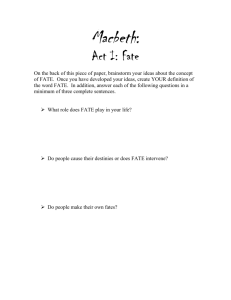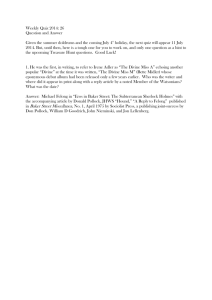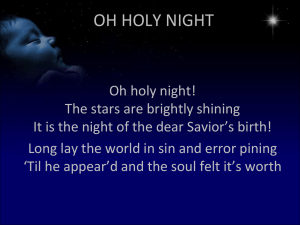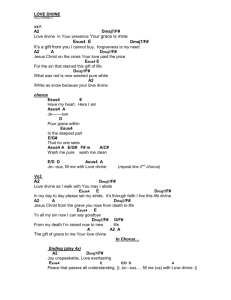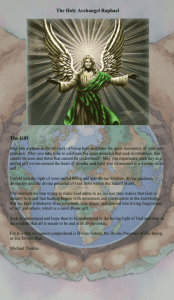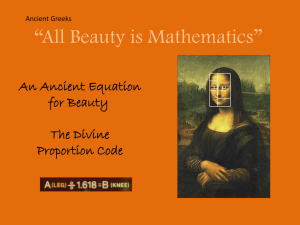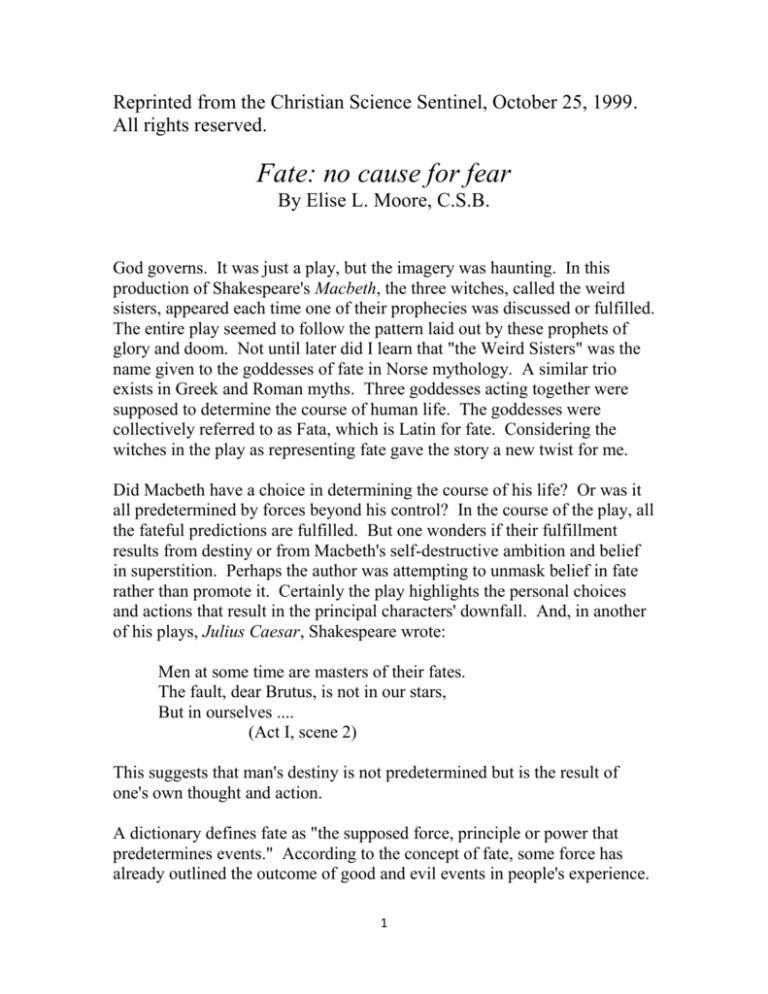
Reprinted from the Christian Science Sentinel, October 25, 1999.
All rights reserved.
Fate: no cause for fear
By Elise L. Moore, C.S.B.
God governs. It was just a play, but the imagery was haunting. In this
production of Shakespeare's Macbeth, the three witches, called the weird
sisters, appeared each time one of their prophecies was discussed or fulfilled.
The entire play seemed to follow the pattern laid out by these prophets of
glory and doom. Not until later did I learn that "the Weird Sisters" was the
name given to the goddesses of fate in Norse mythology. A similar trio
exists in Greek and Roman myths. Three goddesses acting together were
supposed to determine the course of human life. The goddesses were
collectively referred to as Fata, which is Latin for fate. Considering the
witches in the play as representing fate gave the story a new twist for me.
Did Macbeth have a choice in determining the course of his life? Or was it
all predetermined by forces beyond his control? In the course of the play, all
the fateful predictions are fulfilled. But one wonders if their fulfillment
results from destiny or from Macbeth's self-destructive ambition and belief
in superstition. Perhaps the author was attempting to unmask belief in fate
rather than promote it. Certainly the play highlights the personal choices
and actions that result in the principal characters' downfall. And, in another
of his plays, Julius Caesar, Shakespeare wrote:
Men at some time are masters of their fates.
The fault, dear Brutus, is not in our stars,
But in ourselves ....
(Act I, scene 2)
This suggests that man's destiny is not predetermined but is the result of
one's own thought and action.
A dictionary defines fate as "the supposed force, principle or power that
predetermines events." According to the concept of fate, some force has
already outlined the outcome of good and evil events in people's experience.
1
While some may be destined to a life of success and salvation, others would
be relegated to a living hell of frustration and futility.
According to fatalism, nothing one does can change the ultimate course of
events. Such a belief would freeze a person into a state of uncertainty and
hopelessness. If predestined to a bad end, what hope would there be for
progress, transformation, regeneration, and salvation? On the other hand, if
fate decrees that success is one's lot in life, how tenuous the rewards would
feel. At any moment fate could change the course of one's life, and good
could disappear for no reason and with no warning. Such fatalism fosters a
stoic acceptance of occurrences, sucking the joy from success and burying
hope in passive helplessness.
Truly, fate represents a godless state of existence, in which mankind would
have little hope of self-determination or salvation.
The Science of Christ denounces fatalism. It denies totally, on the basis of
one all-good, omnipotent God, that there could be a mysterious power for
good or evil manipulating human life without one's consent. Man and
woman, as God's offspring, have the divine right of self-government.
Because of this each one of us is free to act up to his or her highest sense of
right and successfully express good. Evil is not inevitable, and good is not
illusive. There is divine power available, strengthening one's choice to
follow good and to be free from immoral influence and action.
God is the divine Principle of the universe. How is God different from fate?
Well, God, the divine Principle of being, doesn't include any elements of
self-destruction or evil, because this Principle is divine Love. Love orders
the universe harmoniously and maintains each idea in a perpetual
unfoldment of good. What a comfort to realize that divine Love leads our
life and destines us to harmony and happiness. What a blessing to feel the
presence of divine Principle, Love, supporting and sustaining one in times of
uncertainty or trial. With God as the Principle of being, we are assured that
good is our preordained destiny and that progress is the law governing our
life. The holy Father and Mother of the universe embraces and blesses each
one of His/Her beloved children, leaving no one to languish in
predetermined misery.
Old theological doctrines sometimes blended pagan notions of fate with the
government of God and conjectured that God foreordained good for some
2
and evil for others. Such beliefs resulted in a confusing view of God as both
loving and punishing, capable both of doing good and of permitting evil.
What hope would mankind have if God, the all-powerful, foreordained sin,
sickness, and death? This is not the original revelation of God given in the
first chapter of Genesis, in which it is reiterated seven times that God created
only good. Doesn't the pronouncement that "God saw every thing that he
had made, and, behold, it was very good" (Gen. 1:31) establish the basis for
good as the divine Principle of being, the origin and ultimate outcome of
existence?
Christ Jesus revealed God as good, according to the New Testament. He
told one follower, "Why callest thou me good? there is none good but one,
that is, God." (Matt. 19:17). On another occasion, Jesus taught God's
impartial bestowal of good, regardless of human worthiness, when he said,
"He maketh his sun to rise on the evil and on the good, and sendeth rain on
the just and on the unjust." (Matt. 5:45) Love's all-embracing mercy and
goodness shine forth to bless all. The abundance and universality of good
indicated in this promise reassure us that divine Principle doesn't play
favorites but imparts good impartially to all. Belief in fate falls before the
supreme power and goodness of divine Principle, Love.
Does humankind have the ability to choose morality and goodness when
faced with evil circumstances or predictions? Certainly. Self-government,
or choosing to act rightly, is natural for the child of God, made in His/Her
image and likeness. As we acknowledge God as the divine Principle
governing creation through spiritual law, it is supremely natural for us to
reflect that higher government in thought and action. Self-determination is
actually the freedom to reflect God and express His goodness in our daily
lives. Nothing can prevent us from thinking and acting rightly and
experiencing the harmony such spirituality brings, from the healing of
disease to the elimination of sinful behavior.
The founder of this magazine, Mary Baker Eddy, felt deeply about the
ability of the individual to choose righteousness and its healing and saving
effects. From girlhood, she rejected the then popular belief of predestination
(see Retrospection and Introspection, pp. 13-15), feeling it was in conflict
with the nature of God as Love. As a mature theologian, she articulated her
views in Science and Health with Key to the Scriptures, where she wrote,
"Man is properly self-governed only when he is guided rightly and governed
by his Maker, divine Truth and Love" (p.l06).
3
Does one have the freedom to choose evil, then? If freedom is living in
accord with good, God, then we could not be truly "free" to choose any other
path. I love this definition of liberty attributed to Joseph H. Thayer in the
computerized PC Study Bible: "True liberty is living as we should, not as we
please." The choice to be free from sin and to express the qualities of God is
ultimately the only option. Yielding to temptation or choosing evil leads to
bondage, not freedom. Jesus stated what might be considered the ultimate
outcome of our right to self-determination: "Be ye therefore perfect, even as
your Father which is in heaven is perfect" (Matt. 5:48).
Destined to perfection. Choosing to accept that one's being is as perfect and
harmonious as our heavenly Father-Mother God. How encouraging it is to
realize that we are able to fulfill this demand. As the reflection of the one,
supreme Principle, Love, man is self-governed and empowered to think and
act rightly, even perfectly.
Man's destiny is predetermined only in the sense that good is prophesied for
all God's creation. As the book of James says, "Every good gift and every
perfect gift is from above, and cometh down from the Father of lights, with
whom is no variableness, neither shadow of turning" (1:17). Unchangeable
divine Love is continuously pouring out goodness and blessing to all. No
blessing is withheld. No good is withdrawn. The promise of every good
and perfect gift encourages us to accept our status as the beloved of God and
recognize our holy heritage.
Fate implies blessing and cursing. But God, good, nullifies the curse on man
and woman through the omnipotence of divine Love. "The curse causeless
shall not come," say the Scriptures (Prov. 26:2). Acknowledging that divine
Principle governs the universe and all that is within it strips any curse of its
supposed validity or authority. Principle empowers only blessing. Like a
car with no engine, a curse has no force to move it. Like a hollow shell, it
may appear impressive on the outside, but with no Principle to propel it, it
has no means to act. Wrong thoughts and words, like the motorless car,
soon cease to attract attention and fall into rusty oblivion.
Thinking about fate as represented by the three goddesses, I began to
consider what modern beliefs embody fatalistic thinking. It occurred to me
that heredity, disease, and destructive elements of nature are sometimes
perceived as modern fates against which one has little influence. Yet, like
4
Macbeth, we do have the choice to accept or reject the negative predictions
made by these modern "weird sisters." We don't need to be amazed,
fascinated, or despondent at their claims to control us.
Heredity would weaken one's self-government by saying that intelligence,
beauty, ability--in fact, practically all the determining factors of life--are
predetermined by genetic codes or ancestral heritage. This "weird" view of
life would limit one from birth and blame others for one's own
shortcomings. Science and Health exposes the insidious nature of accepting
heredity as fate. The author warns, "Heredity is a prolific subject for mortal
belief to pin theories upon; but if we learn that nothing is real but the right,
we shall have no dangerous inheritances, and fleshly ills will disappear" (p.
228). She continues further on, "Mortals will some day assert their freedom
in the name of Almighty God. Then they will control their own bodies
through the understanding of divine Science."
With divine Principle, Love, as the source of our being, only good and
perfect gifts can be given and received. God has bestowed all good, and we
can recognize our status as the complete reflection and expression of His
goodness.
Modern medicine has so adopted the role of predicting evil and good that
humankind almost unthinkingly accepts its prognostications as fact and fate.
Jesus, on the other hand, never accepted illness as fatal nor as ordained by
God or fate. He healed sickness and restored the dead to life. Christ--the
idea of God which Jesus proved--awakens one to challenge medical
predictions. Christ saves by restoring the true sense of life and health. As
we awaken to our spiritual being as the image of God, predictions of disease
or demise cease to frighten us. Christ, the power of God, is immediately
present to heal and save. Therefore, we are not struggling alone with
medical predictions. Rather, we are at one with God and His Christ, filled
with the power of good, under the government of divine Principle. Like the
causeless curse, disease has no power to overcome health and goodness.
Empowered by divine Principle, God, health replaces the diseased beliefs
with the holy harmony of divine Love, the perfect substance of divine Spirit.
References to fate and feelings of fatalism surround natural disasters as well.
The belief that weather is uncontrollable and disasters unavoidable promotes
a fatalistic acceptance of random victimization. Yet numerous examples
have been cited in this magazine and its sister publication The Christian
5
Science Journal, in which prayer has protected individuals and communities
from violent weather and has even altered the predicted intensity or path of
phenomena. Discerning the power of Christ to defend and save mankind
from every form of turbulence encourages one to pray in the face of
untoward weather phenomenon, rather than accept a fatalistic view of
events.
A friend and his daughter found themselves squarely in the path of a tornado
as it ripped, without warning, through our community. Trapped in their
vehicle with debris swirling around them, the daughter was comforted when
her dad assured her that God was right there with them. This declaration
was the opposite of fatalistically enduring a raging storm and hoping for the
best. It was a prayerful turning to the one power, divine Love, which the
dad genuinely felt was surrounding and protecting them at that very
moment. After the tornado moved past them, they literally could not see out
of the windows of their van, which was caked with dirt. While commercial
trucks and cars had been upended and overturned, no one was seriously
injured, and my friends and their vehicle were safe.
God does not yield His supreme power to any confederation of so-called
minor deities. The nature of God is to save His/Her creation from trouble,
not to abandon or relegate any element of it to inescapable suffering. Love's
purpose is to bless, defend, and harmoniously govern. Through Love's
government, men and women truly become "masters of their fates."
6

